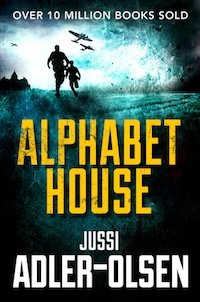Translated by Steve Schein – Published for the first time in English, Alphabet House was Danish author Jussi Adler-Olsen’s first book in his native language, predating the Department Q series which includes Mercy and Disgrace. It is an ambitious psychological thriller that was inspired by his own upbringing around psychiatric hospitals where his father worked.
Although it first appeared in 1997, the book’s historical setting means it has not dated like other Scandinavian crime novels translated with a time lag, such as the latest by Arne Dahl. Alphabet House begins in 1944 in the midst of World War II, though in the book’s foreword Adler-Olsen is adamant that it isn’t a war novel.
By the end of the book, you’ll be in complete agreement. The conflict is the trigger for an astonishing premise relating to the limits of psychological endurance and irreparable breaches in relationships. If that sounds like heavy going, it’s really not: Alphabet House is a thrilling adventure that’s never weighed down by Adler-Olsen’s exploration of human psychology over three decades.
The book is almost a bit too gung-ho to begin with as pilots and close friends James and Bryan fly off together in a two-seater P-51D Mustang fighter, an American plane for a US-backed reconnaissance mission to photograph a hidden Nazi weapons facility near Dresden. Amid dialogue filled with endless exclamation marks, the pilots come across as slightly clichéed British chaps with their Eton and Cambridge backgrounds.
When the plane is damaged and they have to bail out behind enemy lines, we see more of the real characters behind their stiff upper lips. Pursued by soldiers and dogs, they make their escape by leaping on board a train. Unfortunately, it’s reserved for gravely wounded SS men on their way home from the Eastern Front.
By disposing of a couple of bodies and coming up with some makeshift tattoos in line with the SS system that registers blood groups, James and Bryan attempt to fake it. They lie in bloodied sheets and pretend to be close to death (after their crash landing and fraught escape, their injuries and trauma are real enough). Eventually, they end up near Freiburg in a psychiatric hospital known as Alphabet House, a nickname based on the Nazi categorisation of mental conditions that are carefully hidden from the public gaze. Most mental patients are liquidated, but the SS officers get preferential treatment thanks to the sympathies of Goebbels’ wife. Of course, they are expected to recover and aid the Nazi war effort in due course.
The British pilots find themselves in the perilous position of being malingerers on a psychiatric ward surrounded by patients whose war records make them some of the most dangerous Nazis in Germany. As they undergo electro-shock therapy and try and fake insanity, the point of view switches between James and Bryan, and it sometimes becomes difficult to keep track of who’s hiding their pills and which one can’t speak German.
However, you are soon swept along by the story on the hospital ward, where they spend month after month with only the occasional hint from overheard conversations among doctors and nurses that the Allies are getting closer.
Adler-Olsen heightens the tension when he introduces a chilling new threat: the British pilots are not the only malingerers. Several SS soldiers who are crooks as well as killers want to get through the war and recover their looted booty, and won’t let anyone stand in their way. Patients begin dying and then the SS malingerers’ suspicions turn to James and Bryan. At this point, Alphabet House reminded me slightly of Stephen King’s Misery. The British pilots have to appear to be slowly recovering patients while plotting their escape.
The narrative switches to 1972 in the second half and, in order to avoid spoilers, it is difficult to say much other than that several characters are brought together in a plot driven by revenge and survivor guilt. While there are one or two convenient coincidences in the plotting, you have to applaud the scope of this well-researched novel whose characters fought in a war that never quite ended for them.
For fans of Adler-Olsen’s Department Q series, this debut is not perfect but it’s full of masterful moments and never less than gripping.
Hesperus Press
Print/Kindle/iBook
£3.79
CFL Rating: 4 Stars










